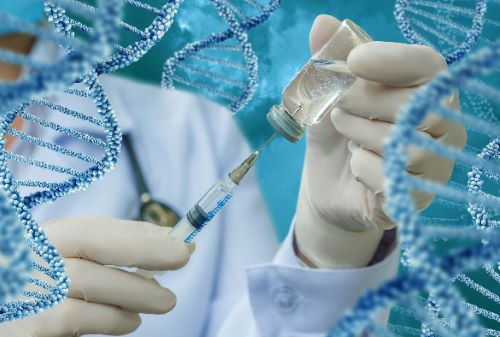University secures £2.66m to develop personalised cancer treatment
 University of Liverpool researchers have secured £2.66m Medical Research Council funding to clinically test a novel immunotherapeutic strategy for non-small cell lung cancer – one of the most deadly cancers.
University of Liverpool researchers have secured £2.66m Medical Research Council funding to clinically test a novel immunotherapeutic strategy for non-small cell lung cancer – one of the most deadly cancers.Professor Christian Ottensmeier, and Professor Natalia Savelyeva from the Institute of Systems, Molecular and Integrative Biology are collaborating with industry partner Genomics England and working closely with Touchlight Genetics Ltd to develop a vaccine therapy for patients with non-small cell lung cancer who have not had sufficient benefit from standard immunotherapy.
Non-small cell lung cancer is the most common type of lung cancer, with almost 50, 000 new diagnoses each year. It is the third most prevalent cancer in the UK and, globally, it is estimated that there were 2.2million new cases in 2020 alone.
Professor Christian Ottensmeier, the chief investigator on the clinical trial and a Consultant in Medical Oncology at The Clatterbridge Cancer Centre NHS Foundation Trust, said: “In this new trial we will make a personalised cancer vaccine for each patient. We want to train the patient’s own immune system by targeting mutations in patients’ individual cancer. We think that this approach could help where standard immunotherapy is not sufficient. This is the case for the majority of patients with lung cancer, where the immune system has not been effective at recognising the cancer cells – we call these tumours ‘immune cold’.”
Professor Natalia Savelyeva added: “Cancer vaccines hold the promise to turn ‘immune cold’ cancers into ‘immune hot’ cancers and if successful could help more than 50% of patients with advanced lung cancer and potentially also patients with other cancers. We are very excited to develop this trial and look forward to making the vaccines available to the patients with non-small cell lung cancer that are seen in our region and at The Clatterbridge Cancer Centre NHS Foundation Trust.”
The team will use the funding to develop the trial to rapidly create personalised ‘doggybone DNA’ vaccines for patients, whose cancer is not benefiting sufficiently from standard immunotherapy. Doggybone DNA production – so called as the produced DNA is shaped like a dog’s bone – involves replication of a DNA using enzymes in a test tube. Compared to standard DNA vaccine production the doggybone approach is more cost effective and, significantly, is quicker when creating personalised genetic medicine.
Dr Helen Horton, Chief Research Officer, Touchlight Genetics Ltd said: “We are very excited to work with Profs Ottensmeier, and Savelyeva. The doggybone DNA technology provides an ideal means to deliver rapid individual personalised vaccines to this large group of patients with an unmet clinical need and other patients with solid cancers.”
The funding was secured through the Development Pathway Funding Scheme (DPFS) and the team were supported through the bid process by the University’s IP Commercialisation team, who work with academics to realise the social and economic benefits of University technologies. The DPFS drives Medical Research Council funded research along the developmental pathway to enable clinical use, patient benefit and commercialisation.





















